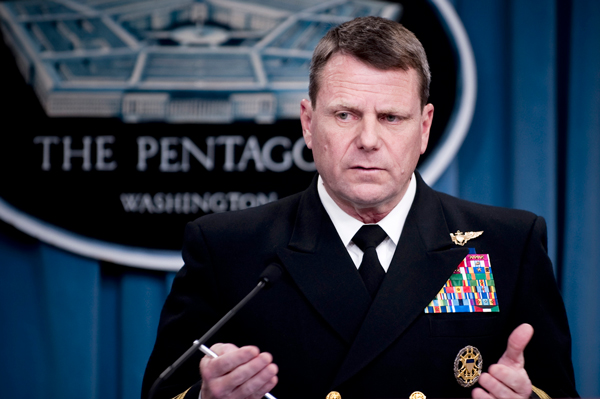
Admiral Bill Gortney visited Alaska for the first time earlier this month since taking over the two organizations tasked with defending North America from attack. Gortney wears two hats: he is head of both the North American Aerospace Defense Command (NORAD), as well as the U.S. Northern Command (NORTHCOM). It’s one of the highest positions in the military chain of command, responsible for dealing with airborne threats–whether missiles launched from a hostile country, or a rogue plane within American air space. After a visit to Fort Wainwright and the missile fields in the Interior, Gortney came to Anchorage for an inspection of Joint Base Elmendorf-Richardson, and talked with KSKA’s Zachariah Hughes about the strategic importance of Alaska to the military’s mission.
Admiral Bill Gortney: The world is round—most people don’t realize that, the world is round. And your location from here allows us to get from here to defend from the Northern approach, as well as to deploy from here. The F-22’s that are stationed here can get to England or to the Middle East quicker than they can from the continental United States there down south. So it’s an incredibly important strategic asset.
As far as recently, the importance of what we do out of this great state—and oh, by the way, the pictures don’t do it justice—is the increased activity in Russian long-range aviation, the “Bear Bombers.” They are, we believe, messaging using these long-range aviation flights. And so very frequently when they come down here we launch assets, aircraft—fighters, tankers, and early warning—from Alaska, and Canada does the same thing. We coordinate that activity, whichever one makes the most sense.
Zachariah Hughes: You said “messaging,” what does that mean?
Adm. Gortney: Well, all countries use their militaries in a messaging way to display strength, should they need to. That’s what we mean by “messaging,” it’s not in a kinetic sense, it’s not hostile. It’s just ‘We’re here, we can do these sorts of things.’
ZH: The Russian long-range craft that have been entering airspace—how frequently is that occurring, and when did it start?
Adm. Gortney: Well, they’ve been doing it since they were the Soviet Union. They took a pause for—I’m not sure how many years, but just recently in the last three or four years the numbers have gone up. I’m not going to give you the percentage, because the percentage implies—ya know, if I said 500% you may get that that’s a whole lot, but five is 500% of one, right? But it has gone up significantly that we’ve notice here, and they’re flying profiles that they haven’t flown before. Now, they’ve never entered our air space, which goes out to 12 nautical miles, but they have entered what we call our Air Defense Identification Zone—and all nations have these, they go pretty far out there. And they’re adhering to the international standards that they’re supposed to out there. The numbers have gone up, but they fly it in a professional manner, just as we fly in a professional manner.
ZH: Switching gears just for a second, the U.S. is poised to take over some new Arctic responsibilities: is the importance of the Arctic changing? And the way capabilities and assets are deployed, are those changing?
Adm. Gortney: Yes, actually one of my assigned missions from the Secretary of Defense is to be the advocate of the Arctic for the Secretary of Defense. And since this is the Arctic—well, a little bit further North if you draw the line correctly—we use the Army and the Airforce, as well as the Coast Guard and a little bit of Navy out of here to do that advocacy role in the Arctic.
[The Arctic is] absolutely critical. This is a pretty harsh place to operate. It takes a particular skill-set, equipment, and people to know how to operate. And this gives us the opportunity to understand that.
ZH: With the national draw-down in the Armed Forces going on, and sequestration looming large over a lot of those conversations, how is your work going to change going forward? And is there any change in the resources you have at your disposal?
Adm. Gortney: Well, coming out of every war there’s a 27-32% reduction in the Department of Defense budget. This goes all the way back to the Revolutionary War, and of course we didn’t have a DOD back then. So this isn’t the first time we’re coming out of a major war and the budget goes down. And so this is a reality we have to deal with. How we do that as a nation is the hard part.
The other piece is that every time we’ve come out of a major war we go into an international security environment better than the one we went in. You would think that’s why you went to war. And just in the last three years, if you look at the international security environment around the world, it is not a more secure environment than we went in. And it’s nobody’s fault—we just didn’t predict it. No one predicted what’s occurred. That is what’s different this time, and that’s what causes me concern.
ZH: Do you still get to fly?
Adm. Gortney: No I don’t, I’m too old.
ZH: Do you miss it?
Adm. Gortney: I do, yeah. But I had a pretty good run. And now it’s up for the young pups to do it.
Zachariah Hughes reports on city & state politics, arts & culture, drugs, and military affairs in Anchorage and South Central Alaska.
@ZachHughesAK About Zachariah




